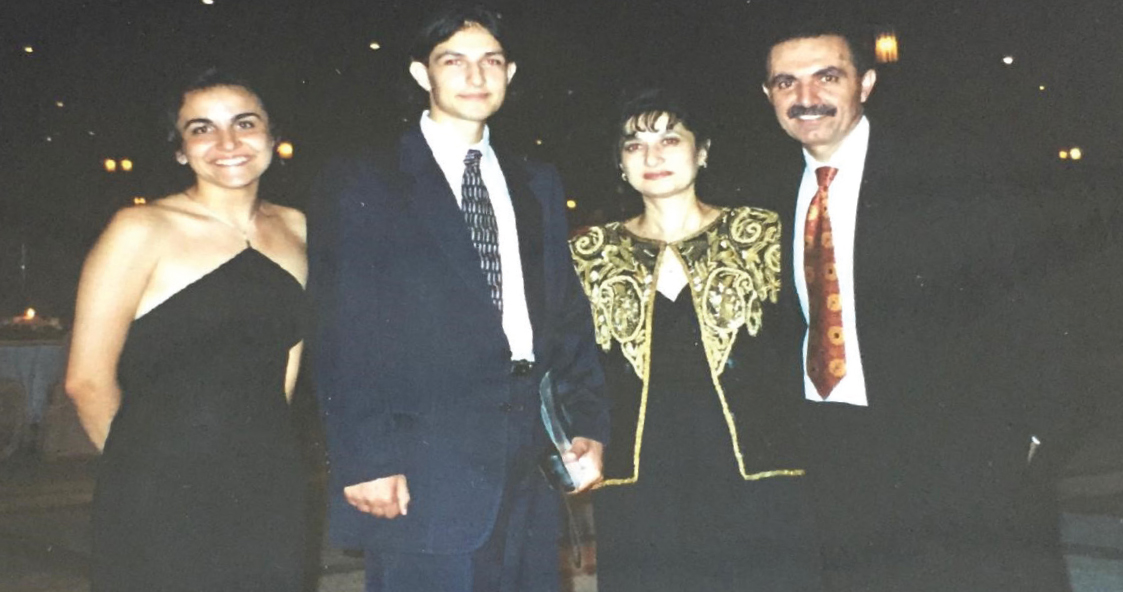
Interview : Gamze Ünal
Koç University Faculty Member Prof. Dr. İskender Yılgör is one of the most prominent academicians of our country and one of the most active in industrial research, who has brought innovative and practical solutions to many industrial problems utilizing the power of knowledge and scientific research. In our interview, he shared his views on many topics ranging from his life journey that brought him to the world of science to the state of university-industry cooperation in our country.
First of all, I would like to start by sharing your childhood memories...
I was born and raised in Mersin in a large house with a garden. In our garden we had mainly oranges and various other fruit trees. My grandmother’s and grandfather’s house shared the same garden. My grandmother and aunt lived with us, I had two brothers and three sisters, and I was the eldest. Growing up, it was wonderful to have the whole family together. My grandfather had a grocery store next to the house, so he also grew vegetables in one part of the garden. We used to irrigate the garden on specific days of the week by directing the local irrigation water, shared among neighbors, to our garden for a certain period—much like the scenes described in the novels of Fakir Baykurt and Yaşar Kemal. We often climbed trees to pick fruits and vegetables, and one of my favorite activities was picking mulberries. Recently, I asked my nephews, “You have a mulberry tree in your garden; have you ever climbed up and picked mulberries?” Of course, they haven’t. Climbing up the trees was easy, but getting down was trickier— you had to develop a strategy. Sadly, children today don’t have such opportunities.
Back in 50s, there were very few cars in Mersin, so the streets belonged to children. I grew up playing all kinds of street games, each requiring different strategies to play better and win. Summers were scorching hot, so we often went to the mountains in Gözne, where we experienced the mountain life and how to deal with the rugged nature. A few times a week, my brother, friends, and I would leave the house in the morning to explore the sur-rounding mountains, discovering new places. We packed some food for our trips and learned how to navigate the terrain, more importantly where to find drinking water and edible wild fruits. We memorized the locations of springs and wild fruit trees. Sometimes, we encountered snakes, scorpions, and other wildlife. We learned how to deal with them, which was a great experience. I think it’s unimaginable for parents today to let their children roam the mountains as we did. As I mentioned earlier, I had a very enjoyable and colorful childhood. These experiences had a very positive impact on my life and career, particularly in developing rational plans, taking calculated risks, and planning effective strategies.
What can you say about your primary school life?
I attended Cumhuriyet Primary School, which was about a kilometer from our house. We used to walk to school every day. My class teacher, Suna Arkun, was excellent. She recognized that I was well ahead of other students and paid special attention to me, which had a profoundly positive effect on my development. My father was a professional photographer. He couldn’t continue his education beyond middle school because there was no high school in Mersin at the time.
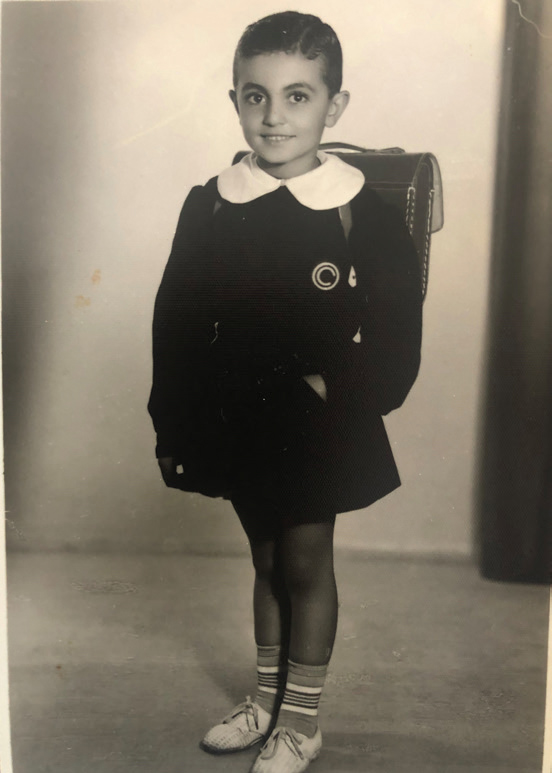 İskender Yılgör ilkokulda
İskender Yılgör ilkokulda
Iskender Yılgör in primary school
However, he saw Atatürk in person and was educated in community centers (Halkevi). This shaped his belief in the importance of a good education, and he was determined that we should excel in every respect. After finishing primary school, I attended Akdeniz College, where the class sizes were small, teachers were some of the bests in Mersin, and English education was very intensive. We had an English teacher named Küşade Turunç who had a master’s degree in the US. By the time I graduated from secondary school, I was fluent in English, which had a tremendously positive impact on my life.
At Akdeniz College, I had a math teacher named Osman Çağlayan, who liked me a lot. He was also teaching a course titled “Commerce” or “Ticaret”, part of the curriculum at the time, a subject I greatly enjoyed. I believe he was a graduate of Köy Enstititüsü. When I was in the second grade, one day he told me; “We will establish a cooperative in the school, and you will manage it!” About 100 students joined the cooperative, contributing 10 liras each as capital. We partnered with a local bookstore and purchased supplies like pencils, erasers, notebooks, and paper. The school provided us with a small shed for our coop. While other students played during breaks, I managed the coop, and in the evenings, I recorded the sales in various bookkeeping records, such as journals, inventory books, and ledgers. By the end of the year, I distributed dividends of 10 liras to each member. This experience taught me invaluable lessons about business and management. Later, I began keeping all my father’s accounting records as well. For high school, I transferred to Toros College because most of our teachers from Akdeniz College, including Osman Çağlayan and Küşade Turunç had also moved there. Our class had only 15 students. After school, I would go to my father’s photography shop to help him out, as did my brothers after me. I swept the shop, dried photographs, trimmed their edges, and numbered them. I also assisted customers, delivered their photographs, and helped my father in the darkroom. Occasionally, when my father was unavailable, I even took photographs myself. Weekly we had to prepare chemical solutions used for developing films and photographs. My father provided the formulas, and I prepared them all. During breaks my favorite joy in the darkroom was immersing copper 5- and 10-penny coins in the thiosulphate bath and watching them get coated with silver. Working in my father’s studio influenced my career tremendously, giving me exposure to the business world and allowing me to interact with people with different backgrounds, whether as customers, visitors or friends. In 1968, I graduated at the top of my class from Toros College, becoming its first graduate.
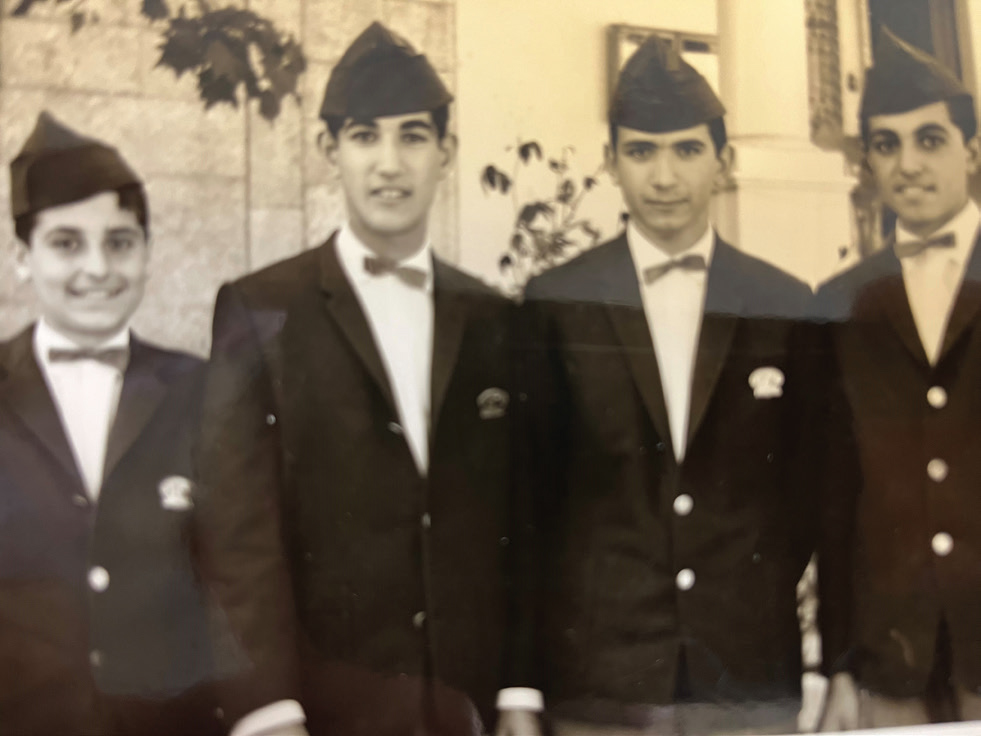 Toros Koleji’nde ilk gün
Toros Koleji’nde ilk gün
First day at Toros College
How did your interest in chemistry begin?
My father had many friends who were medical doctors, who often visited his studio. One of the most influential figures in my decision to become a chemist was a family friend named Zühtü Ungan (uncle Zühtü), who ran a biochemical analysis laboratory that conducted tests for these medical doctors. Uncle Zühtü was an exceptionally intellectual person who deeply valued science. I would visit his laboratory, watch him work, and ask countless questions. Since there were no electronic devices back then, all the work was done by hand using simple instruments—the most advanced being the microscope. As I observed his experiments, he patiently provided detailed answers to my questions and often asked me questions in return. These interactions had a profound impact on me and ultimately inspired my passion for chemistry.
Before taking the METU entrance exam, I chose only the Department of Chemistry and was admitted with a high score. I started my freshman year in October 1968, skipping English preparatory school. While everything seemed to be going well, an event on January 6, 1969, dramatically altered our academic lives. On that day, US Ambassador Komer’s car was set on fire in front of the Rectorate during his visit to the university. Following this incident, the university was closed for a long time, and for the next four years, no semester started or ended on schedule. Despite these disruptions, the chemistry education I received at METU as part of the 1968 generation was outstanding. In my opinion, METU was a world-class university at that time. After graduation, while many of my peers pursued PhDs in the USA, I chose to continue my studies in Türkiye. I began my graduate studies in Polymer Chemistry under the supervision of Prof. Bahattin Baysal. The METU Polymer Research Institute, founded by Prof. Baysal, was an exceptional research environment. It was staffed by top-notch, young faculty members with PhDs from USA working in collaboration across nearly every field related to polymers. Our laboratory facilities were excellent, and we had access to a wide range of elective courses, which broadened our scientific vision and thinking. The Institute was incredibly successful and produced many accomplished scientists. Unfortunately, such well-organized and collaborative academic groups are rare in Türkiye today, as most individuals work independently. As members of the 1968 generation at METU, we also benefited from a wide array of social and cultural experiences in addition to our academic education. These experiences significantly contributed to shaping our personalities and perspectives.
How did you decide to go to USA?
While I was doing my PhD, I met my wife Emel (Özgören) Yılgör, who was studying at METU Department of Chemical Engineering. After my PhD, as a young scientist, I started working at METU as an Assistant Professor, teaching various courses and advising young students. Everything was going well, but towards the 1980s, political and economic problems were increasing in our country. This naturally affected our scientific work. For example, it was not possible to buy research materials for the laboratory or even get a broken instrument repaired. At that time, my wife Emel graduated from Chemical Engineering, we got married and at the end of March 1980, we went to the United States for a year or two to do research at Virginia Tech. The Virginia Tech Polymer Group had been established in 1977 by three professors who complemented each other and worked very harmoniously together. Jim McGrath was working in organic chemistry and polymer synthesis, Tom Ward in physical chemistry and polymer characterization and Garth Wilkes in engineering and polymer morphology. In short, research was being done in all areas related to polymers. This allowed me to see the big picture in Polymer Science. Between 1980 and 1985, I visited the best polymer laboratories in US and saw that METU Polymer Research Institute was on par with them and I was very happy with the decision I made for my PhD. The research environment at Virginia Tech was very active, motivating and inspiring. I was working on polymer synthesis and my wife was involved in research on polymer characterization. In addition to the sponsored projects, we were allowed to work on any topic we wanted and go to any scientific meeting. Research, innovation and learning became our lifestyle. For this reason, although our original plan was to stay at Va Tech for 2 years and return to METU, we decided to resign from METU.
By 1985, Virginia Tech Polymer Group had become one of the leading polymer groups in the world and may be the best! One of my most important and critical observations, from the very beginning, was Prof. McGrath’s incredibly broad vision, vast knowledge and his suggestion of many practical solutions to problems. I learned that the reason behind this was that Prof. McGrath’s 17 years of industrial research experience before joining Va Tech as a professor. This was a situation I had never observed in our country. For this reason, at the end of the 5th year, I decided to work in industry in the US instead of returning to Türkiye. I especially wanted to go to a small company to gain experience in research, production and management. I started working at Thoratec in Berkeley, California as the Director of Research, where after 1 year I became VPRD.
My wife, who is a Chemical Engineer, was the Process Development and Production Manager. At Thoratec, we worked hard, learned quite a lot, gained unique industrial experience and had a lot of fun. One of the most important experiences was the production of 3 ton batches of polyurethane starting with 50 g reactions in research laboratory. While working at Thoratec, a German company, Goldschmidt was interested in the silicone and polyurethane technologies we had developed and offered my wife and me a job to set up an R&D center and a production facility in their plant in Hopewell, Virginia. We accepted this challenging offer. Goldschmidt also acquired some of the technologies we had developed at Thoratec. All these products are now commercially available from Evonik, which acquired Goldschmidt. Our nearly 10 years of industrial experience in Berkeley and Hopewell has taught us a lot. We worked on many commercially important projects in the field of polymers, where we developed new products or tried to produce practical solutions based on scientific research. All these experiences have contributed greatly to the education we provide and the research we do at Koç University.
Afterwards, we see you as the founding Professors of Koç University Department of Chemistry...
While working at Goldschmidt, we attended the Spring 1993 congress of the American Chemical Society in San Diego, California. Our longtime friend, Prof. Burak Erman, was also there. During a dinner, Burak told us; “A new university is being established in Türkiye called Koç University. Its Founding Dean, Atilla Aşkar, is a classmate of mine. I’m joining the university, but I work theoretically, and you are experimentalists. Let’s establish the Chemistry Department together.” A few months later, we met Prof. Seha Tiniç, the first Rector of Koç University, at a meeting of the Association of Turkish American Scientists (ATAS) in Washington, DC. We received detailed information about the university and later had a meeting with the Dean, Prof. Atilla Aşkar, at the Koç office in Empire State Building in New York. During our meeting, Prof. Aşkar explained the university’s goals and vision. In the summer of 1994, we visited Koç University and decided to return to Türkiye to help build the Chemistry Department. Starting from scratch, my wife Emel and I established the student and polymer research laboratory. After moving to the university’s new campus, we founded the Surface Science and Technology Research Center (KUYTAM) supported by a $10 million grant from Turkish State Planning Organization (DPT). We also established Institute of Health Sciences, the graduate school bringing together Science, Engineering and Medical Faculties.
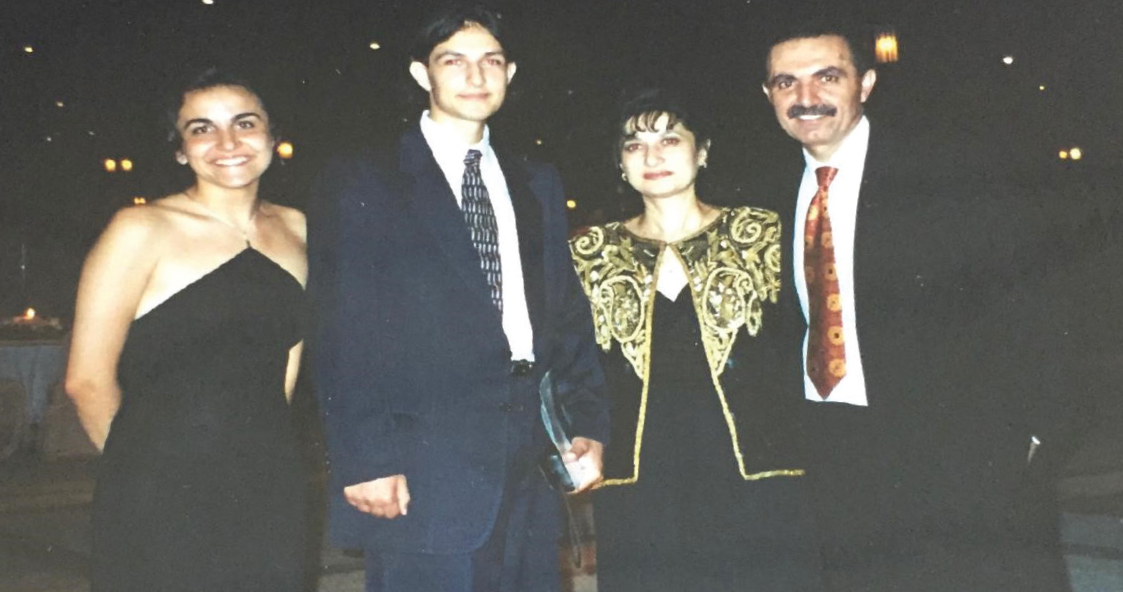 Koç Üniversitesi ilk mezunları
Koç Üniversitesi ilk mezunları
Koç University’s first graduates
The early years of Koç University were truly remarkable. Members of the Koç family, including Mr. Vehbi Koç, Mr. Rahmi Koç, Mrs. Semahat Arsel, Ms. Suna Kıraç, and Ms. Sevgi Gönül, attended New Year’s dinners and sat at different tables to interact directly with faculty. They used these opportunities to share their vision for the university and gather feedback about its progress. They were deeply committed to the university’s success. At the New Year’s dinner in 1995, Mr. Vehbi Koç came to our table and said, “I would like to thank you for leaving your work and coming here from all over the world, for trusting me, and for taking risks on my behalf. I couldn’t study, I don’t speak a foreign language, but I’ve achieved great things. I don’t want our young people to be less successful. I am ready to provide whatever financial support is needed to make this university one of the best in the world”. We have never forgotten these inspiring words from the patriarch of the Koç family, and they remain a vital source of motivation for us.
We had very bright, curious and hard-working students, and we started involving them in research laboratory work during their undergraduate years. We published numerous refereed articles based on their work before they graduated, where they were co-authors. As a result, I believe we have positively influenced the lives of hundreds of students, many of whom pursued their PhDs in the United States. We consistently advised them: “Don’t return to Türkiye without gaining industrial experience after your PhD.” Many followed this advice and achieved great success, either returning to Türkiye or continuing their careers successfully worldwide. To date, we have published two books and around 150 scientific articles, obtained about 20 international patents, and received various awards both in Türkiye and abroad. One of the most significant of these is the TÜBİTAK Science Award, which I was honored to receive in 2003.
What do you think about university-industry collaboration?
At Koç University, we conducted innovative, product-oriented research projects, supported by Turkish, US and European companies. These projects led to the development of original, high-value-added commercial products. In 1996, we secured a major research grant from the Ministry of National Defense to develop and produce “Military Cold Climate Clothing in Türkiye”. We successfully developed a polyurethane membrane or textile coating to replace a product which has been imported. In addition, we published scientific papers and secured patents based on our research. We demonstrated how scientific projects, starting with experiments on as little as 5–10 grams in a university laboratory, can evolve into successful commercial products. Companies worldwide producing original, knowledge-based products still contact us to help them to solve their challenges. For example, a few months ago, I received an email from China which said: “We are the largest sneaker manufacturer in China. We came across your old articles on silicone-polyether-urethanes and believe we could improve the performance of our shoes using some of these polymers you developed. Can you help us?”. Such inquiries highlight the global demand and search for new knowledge and know-how, which does not depend on where you are located.
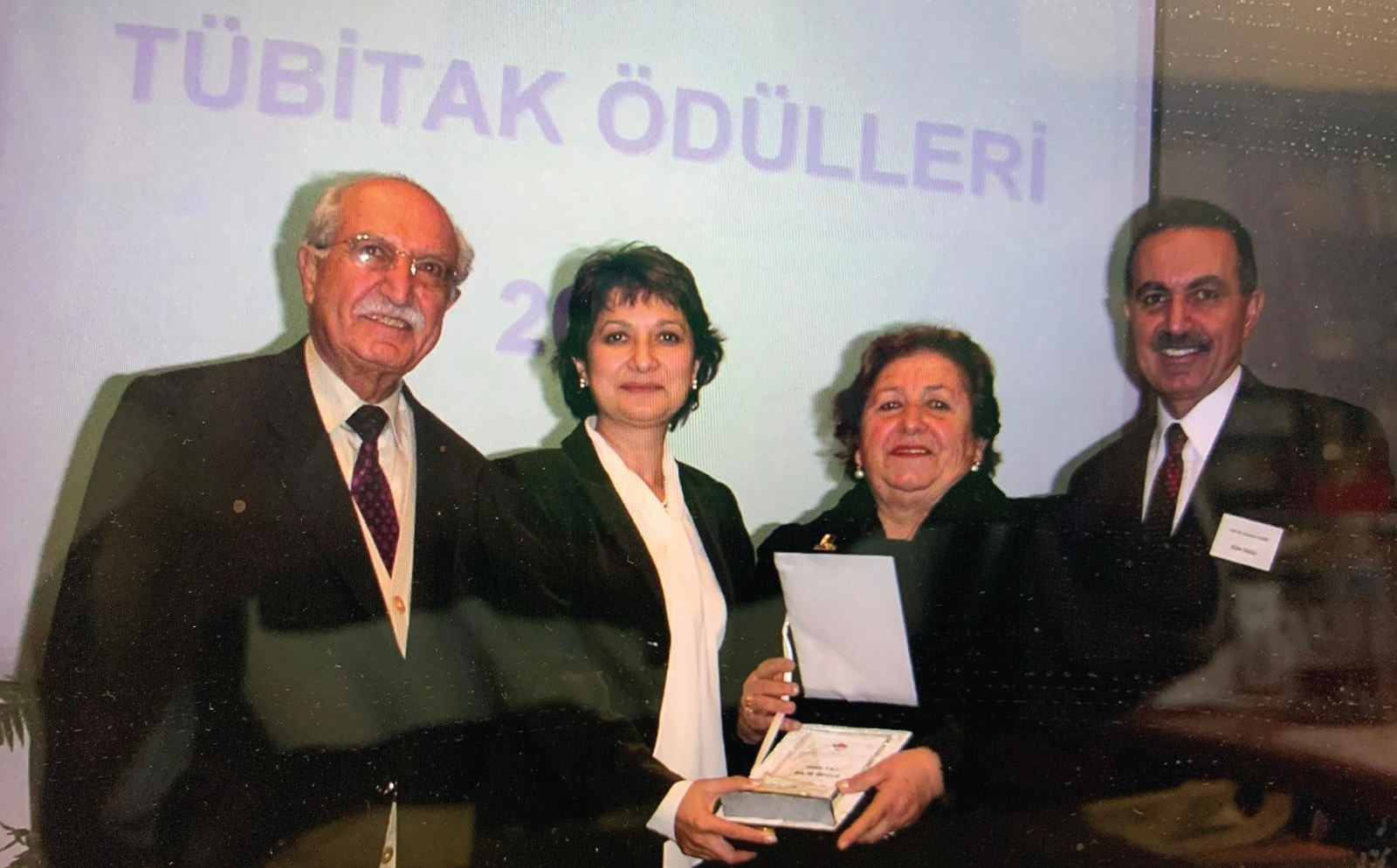 TÜBİTAK ödül töreninde
TÜBİTAK ödül töreninde
At the TÜBİTAK award ceremony
Strong university-industry cooperation is essential for driving innovation and creating novel, knowledge-based products. Based on my 30 years at Koç University, I have found out that our chemical industry tends to focus on simpler, low-risk products rather than developing novel, high-value-added products based on leading edge scientific research. This is clearly reflected in the number of scientific publication and global patent applications by the Turkish Chemical Companies. Breaking this cycle requires the establishment of a robust university-industry collaboration system. Only through such partnerships we can achieve the development of truly original and innovative products. In the past, I attributed the lack of effective university-industry cooperation in Türkiye to insufficient financial support from the industry. However, I later realized that there are also relatively few research groups in our universities capable of carrying out such research projects, leading to innovative products and technologies. I believe this is mainly due to individual efforts by the academicians instead of collaboration. To address complex industrial challenges, universities should establish research groups or institutes with broad participation of faculty members with diverse but complementary background and interests. I believe establishment of such academic research institutions would significantly enhance the industry-university cooperation and lead to the discovery of novel, innovative products and technologies and increase the competitive edge of our chemical companies globally.
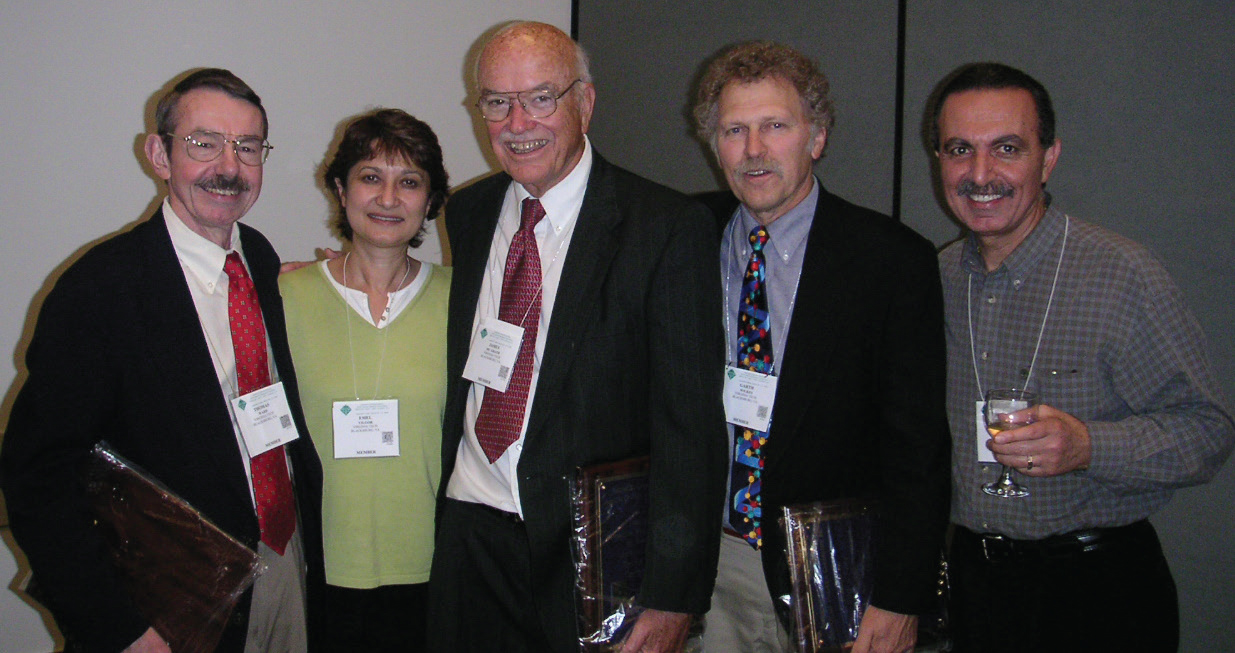 Vatech Poly şirketi yöneticileriyle
Vatech Poly şirketi yöneticileriyle
With Vatech Poly company executives
What do you think about education in Türkiye?
Education begins in the family. Currently, the education provided by families and society seems to be quite inadequate. I grew up in a large family where my grandparents, parents, aunt, and uncle played significant roles in my upbringing. I learned different things from each of them, and my education truly began at home. As I mentioned earlier, the schools we attended had small class sizes, well-experienced and knowledgeable teachers, who had a strong focus on guiding the students. In middle and high school, we received an intensive education in English language, science and social sciences, which played critical roles in shaping our personalities and preparing us for the future. Back then, there were fewer universities, but their quality was very high. University graduates were offered excellent job opportunities. Today, however, the situation is very different. For years, the results of the PISA exam, conducted by the OECD to assess the quality of middle and high school education, have been alarmingly poor for Türkiye. We see the negative effects of this decline in the students entering universities. This situation must change. Countries like South Korea, China, Singapore, and Taiwan have successfully reformed their education systems, leading to remarkable progress. Türkiye needs to follow a similar path to ensure much better opportunities for future generations.
What are your recommendations for young academicians or those who want to become an academician?
First and foremost, they need to make continuous learning as a way of life. For those pursuing PhD in Türkiye, it will be very beneficial to have post-doctoral studies at world’s leading universities. This will allow them to see a different culture regarding how scientists around the globe think, work, and conduct groundbreaking research. If possible, it would also be highly beneficial to work in industry for at least a few years. Such an experience will provide insight into real-world problems in their field and expose them to innovative scientific solutions through scientific research. In academia, many people focus solely on research to generate publications. However, throughout my career, I never conducted research just to publish. My goal was to uncover the unknown and contribute to improving people’s quality of life. Instead of prioritizing quantity, I aimed to publish high-quality work that attracted the attention of the global research community and had practical applications. Prof McGrath always reminded us that, “An article that no one reads is like garbage, but your name will remain on it forever. If you’re going to write garbage, don’t write at all!” These words have stayed with me and reflect my belief that impactful research should always be the goal of scientific research. To be successful, young academics should cultivate a broad perspective, master both written and spoken English, and commit to continuous learning. They should also collaborate with individuals and groups working on similar or complementary topics rather than working alone. Collaboration fosters innovation and allows researchers to tackle complex problems more effectively. Thank you very much.